OpenStack VPS And Cloud For WHMCS
| Line 1: | Line 1: | ||
| − | <h4 style="color: #ff0000; font-weight:bold; text-align:center;">OpenStack VPS For WHMCS article is | + | <meta name="keywords" content="openstack vps for whmcs, openstack vps configuration, whmcs openstack vps management, whmcs openstack vps installation, whmcs openstack vps common problems, about whmcs openstack vps, whmcs openstack vps documentation, whmcs openstack vps faq, whmcs openstack vps help, whmcs openstack vps guide, whmcs openstack vps wiki, whmcs openstack vps tutorial, whmcs openstack vps tips, whmcs openstack vps wiki"></meta> |
| + | <meta name="description" content="ModulesGarden Wiki Contains All The Information You Need About The OpenStack VPS For WHMCS Module."></meta> | ||
| + | |||
| + | =About [http://www.modulesgarden.com/products/whmcs/openstack_vps/features OpenStack VPS For WHMCS]= | ||
| + | {| | ||
| + | <h4 style="color: #ff0000; font-weight:bold; text-align:center;">OpenStack VPS For WHMCS article is currently in its building stage, watch out for broken links and unclear descriptions!<br /> | ||
| + | We are sorry for the inconveniences.</h4> | ||
| + | |style="padding: 10px 0px 10px 0px;"|'''OpenStack VPS For WHMCS''' is a powerful module which allows you to automatically provision virtual servers to your customers.<br /> | ||
| + | Additionally it allows you to conveniently manage your servers.<br /> | ||
| + | The great advantage of this module is the fact that customers can manage virtual servers, backups and much more in your own WHMCS client area! | ||
| + | |} | ||
| + | *'''Admin Area Features:''' | ||
| + | {| | ||
| + | |style="padding: 10px 0px 0px 30px;"|✔ | ||
| + | |} | ||
| + | {| | ||
| + | |style="padding: 0px 0px 0px 30px;"|✔ | ||
| + | |} | ||
| + | {| | ||
| + | |style="padding: 0px 0px 0px 30px;"|✔ | ||
| + | |} | ||
| + | {| | ||
| + | |style="padding: 0px 0px 10px 30px;"|✔ | ||
| + | |} | ||
| + | *'''Additionally:''' | ||
| + | {| | ||
| + | |style="padding: 10px 0px 0px 30px;"|✔ Multi-Language Support | ||
| + | |} | ||
| + | {| | ||
| + | |style="padding: 0px 0px 10px 30px;"|✔ Supports WHMCS V5 and Later | ||
| + | |} | ||
| + | *'''Available Configurable Options:''' | ||
| + | {| | ||
| + | |style="padding: 10px 0px 0px 30px;"|✔ | ||
| + | |} | ||
| + | {| | ||
| + | |style="padding: 0px 0px 0px 45px;"|✔ | ||
| + | |} | ||
| + | {| | ||
| + | |style="padding: 0px 0px 10px 45px;"|✔ | ||
| + | |} | ||
| + | |||
| + | =Installation and Configuration= | ||
| + | {| | ||
| + | |style="padding: 10px 0px 30px 0px;"|'''This tutorial will show you how to successfully install and configure OpenStack VPS For WHMCS.''' <br /> | ||
| + | We will guide you step by step through the whole installation and configuration process. | ||
| + | |} | ||
| + | ==Installation== | ||
| + | {| | ||
| + | |style="padding: 10px 0px 20px 15px;"|'''1. Log in to your client area and download OpenStack VPS For WHMCS.''' | ||
| + | |} | ||
| + | {| | ||
| + | |style="padding: 0px 0px 20px 25px;"|[[File:OSV1.png]] | ||
| + | |} | ||
| + | {| | ||
| + | |style="padding: 0px 0px 20px 15px;"|'''2. Upload and extract the module into the main WHMCS directory.''' | ||
| + | |} | ||
| + | {| | ||
| + | |style="padding: 0px 0px 20px 25px;"|[[File:OSV2.png]] | ||
| + | |} | ||
| + | {| | ||
| + | |style="padding: 0px 0px 15px 15px;"|'''3. When you install OpenStack VPS for the first time you have to rename '' 'license_RENAME.php' '' file.'''<br /> | ||
| + | File is located at '' 'modules/servers/OpenStackVPS/license_RENAME.php' ''. Rename it from '' 'license_RENAME.php' '' to '' 'license.php' '' . | ||
| + | |} | ||
| + | {| | ||
| + | |style="padding: 0px 0px 20px 25px;"|[[File:OSV3.png]] | ||
| + | |} | ||
| + | {| | ||
| + | |style="padding: 0px 0px 15px 15px;"|'''4. In order to configure your license key, you have to edit a previously renamed '' 'license.php' '' file.'''<br /> | ||
| + | Enter your license key between quotation marks as presented on the following screen.<br /> | ||
| + | You can find your license key at your client area → '' 'My Products' ''. | ||
| + | |} | ||
| + | {| | ||
| + | |style="padding: 0px 0px 30px 25px;"|[[File:OSV4.png]] | ||
| + | |} | ||
| + | |||
| + | ==Configuration of Server== | ||
| + | {| | ||
| + | |style="padding: 10px 0px 15px 15px;"|'''5. Now, we will show you how to configure a new product.''' <br /> | ||
| + | Go to '' 'Setup' '' → '' 'Products/Services' '' → '' 'Servers' '' and press '' 'Add New Server' ''. | ||
| + | |} | ||
| + | {| | ||
| + | |style="padding: 0px 0px 20px 25px;"|[[File:OSV5.png]] | ||
| + | |} | ||
| + | {| | ||
| + | |style="padding: 0px 0px 10px 15px;"|'''6. Next, enter your server name, IP address/hostname, username, password and admin tenant ID. Choose '' 'OpenStackVPS' '' from a dropdown menu and press '' 'Save Changes' ''.''' | ||
| + | |} | ||
| + | {| | ||
| + | |style="padding: 0px 0px 20px 25px;"|[[File:OSV6.png]] | ||
| + | |} | ||
| + | {| | ||
| + | |style="padding: 0px 0px 15px 15px;"|'''7. After you configure your server correctly, you will see a following screen.''' <br /> | ||
| + | You can check connection with OpenStack server, simply edit previously created server and press '' 'Test Connection' '' as shown on the screen below. | ||
| + | |} | ||
| + | {| | ||
| + | |style="padding: 0px 0px 20px 25px;"|[[File:OSV7.png]] | ||
| + | |} | ||
| + | {| | ||
| + | |style="padding: 0px 0px 20px 15px;"|'''8. It is time to create a server group. To do so, click on a '' 'Create Server Group' ''. | ||
| + | |} | ||
| + | {| | ||
| + | |style="padding: 0px 0px 20px 25px;"|[[File:OSV8.png]] | ||
| + | |} | ||
| + | {| | ||
| + | |style="padding: 0px 0px 20px 15px;"|'''9. Enter name, click on your previously created server, press an '' 'Add' '' and afterwards a '' 'Save Changes' ''.''' | ||
| + | |} | ||
| + | {| | ||
| + | |style="padding: 0px 0px 30px 25px;"|[[File:OSV9.png]] | ||
| + | |} | ||
| + | |||
| + | ==Configuration of Product== | ||
| + | {| | ||
| + | |style="padding: 10px 0px 15px 15px;"|'''10. In order to create and configure a product go to the '' 'Setup' '' → '' 'Products/Services' '' → '' 'Products/Services' ''.'''<br /> | ||
| + | Click on '' 'Create a New Group' ''. | ||
| + | |} | ||
| + | {| | ||
| + | |style="padding: 0px 0px 20px 25px;"|[[File:OSV10.png]] | ||
| + | |} | ||
| + | {| | ||
| + | |style="padding: 0px 0px 20px 15px;"|'''11. Enter product group name and press '' 'Save Changes' ''.''' | ||
| + | |} | ||
| + | {| | ||
| + | |style="padding: 0px 0px 20px 25px;"|[[File:OSV11.png]] | ||
| + | |} | ||
| + | {| | ||
| + | |style="padding: 0px 0px 15px 15px;"|'''12. When you have a product group, you can create your product. '''<br /> | ||
| + | To create a product click on '' 'Create a New Product' ''. | ||
| + | |} | ||
| + | {| | ||
| + | |style="padding: 0px 0px 20px 25px;"|[[File:OSV12.png]] | ||
| + | |} | ||
| + | {| | ||
| + | |style="padding: 0px 0px 15px 15px;"|'''13. Afterwards, choose your product group and type from dropdown menus, enter your product name and press '' 'Continue' ''.'''<br /> | ||
| + | '' 'Product Type' '' should be set to '' 'Dedicated/VPS Server' ''. | ||
| + | |} | ||
| + | {| | ||
| + | |style="padding: 0px 0px 20px 25px;"|[[File:OSV13.png]] | ||
| + | |} | ||
| + | {| | ||
| + | |style="padding: 0px 0px 15px 15px;"|'''14. Now, go to the '' 'Module Settings' '' section, choose both '' 'OpenStackVPS' '' and your previously created server group from dropdown menus.<br /> | ||
| + | Next, click on '' 'Save Changes' ''.''' | ||
| + | |} | ||
| + | {| | ||
| + | |style="padding: 0px 0px 20px 25px;"|[[File:OSV14.png]] | ||
| + | |} | ||
| + | ==VPS With Predefined Resources== | ||
| + | {| | ||
| + | |style="padding: 15px 0px 15px 15px;"|Our module allows you to offer OpenStack VPS to your client in two ways: with predefined resources and configurable resources.<br /> | ||
| + | In this section we will show you configuration of VPS with predefined resources.<br /> | ||
| + | Configuration of VPS with resources chosen by client can be found [http://www.docs.modulesgarden.com/OpenStack_VPS_For_WHMCS here]. | ||
| + | |} | ||
| + | {| | ||
| + | |style="padding: 0px 0px 15px 15px;"|'''15. Start from selecting '' 'Default Tenant' '', '' 'Default Flavor' '' and '' 'Default ISO Image' ''. | ||
| + | |} | ||
| + | {| | ||
| + | |style="padding: 0px 0px 20px 25px;"|[[File:OSV15.png]] | ||
| + | |} | ||
| + | {| | ||
| + | |style="padding: 0px 0px 15px 15px;"|'''16. Afterwards, it is time to set up a network. Choose '' 'Fixed Network' '', '' 'Floating Network' '' and '' 'Default Number Of IP Addresses' ''.<br /> | ||
| + | You can set up network in two ways, more about them you can find [http://www.docs.modulesgarden.com/Working_Area_2#Network_Configuration_Cases here].<br /> | ||
| + | On the following screen I will set up a network without floating IP address. | ||
| + | |} | ||
| + | {| | ||
| + | |style="padding: 0px 0px 20px 25px;"|[[File:OSV16.png]] | ||
| + | |} | ||
| + | {| | ||
| + | |style="padding: 0px 0px 15px 15px;"|'''17. Finish through selecting features available at the client area.<br /> | ||
| + | Mark checkbox next to the feature to enable it. Press '' 'Save Changes' '' when you are done. | ||
| + | |} | ||
| + | {| | ||
| + | |style="padding: 0px 0px 30px 25px;"|[[File:OSV17.png]] | ||
| + | |} | ||
| + | |||
| + | ==VPS With Configurable Resources== | ||
| + | {| | ||
| + | |style="padding: 0px 0px 15px 15px;"|'''18. Preparing VPS with configurable options starts of pressing '' 'Generate default' '' as shown on the following screen.'''<br /> | ||
| + | It will prepare default configurable options which can be afterwards easily edited by you based on [http://www.docs.modulesgarden.com/General#How_To_Use_Configurable_Options this article]. | ||
| + | |} | ||
| + | {| | ||
| + | |style="padding: 0px 0px 20px 25px;"|[[File:OSV18.png]] | ||
| + | |} | ||
| + | {| | ||
| + | |style="padding: 0px 0px 15px 15px;"|'''19. Afterwards, it is time to set up a network. Choose '' 'Fixed Network' '', '' 'Floating Network' '' and '' 'Default Number Of IP Addresses' ''.<br /> | ||
| + | You can set up network in two ways, more about them you can find [http://www.docs.modulesgarden.com/Working_Area_2#Network_Configuration_Cases here].<br /> | ||
| + | On the following screen I will set up a network without floating IP address. | ||
| + | |} | ||
| + | {| | ||
| + | |style="padding: 0px 0px 20px 25px;"|[[File:OSV19.png]] | ||
| + | |} | ||
| + | {| | ||
| + | |style="padding: 0px 0px 15px 15px;"|'''20. Finish through selecting features available at the client area.<br /> | ||
| + | Mark checkbox next to the feature to enable it. Press '' 'Save Changes' '' when you are done. | ||
| + | |} | ||
| + | {| | ||
| + | |style="padding: 0px 0px 30px 25px;"|[[File:OSV20.png]] | ||
| + | |} | ||
| + | {| | ||
| + | |style="padding: 0px 0px 30px 15px;"|'''Congratulations! You have just finished the installation and configuration of the module.''' | ||
| + | |} | ||
| + | |||
| + | =Management= | ||
| + | {| | ||
| + | |style="padding: 10px 0px 15px 0px;"|''' OpenStack VPS For WHMCS allows your customers to manage their OpenStack VPS via client area in your WHMCS system.'''<br /> | ||
| + | You can monitor and manage each product from your WHMCS admin area. | ||
| + | |} | ||
| + | {| | ||
| + | |style="padding: 0px 0px 20px 25px;"|[[File:OSV23_5.png]] | ||
| + | |} | ||
| + | {| | ||
| + | |style="padding: 0px 0px 20px 0px;"|Afterwards, enter IP address in a textbox and confirm through '' 'Save Changes' ''. | ||
| + | |} | ||
| + | {| | ||
| + | |style="padding: 0px 0px 30px 25px;"|[[File:OSV23_6.png]] | ||
| + | |} | ||
| + | ==Interface== | ||
| + | {| | ||
| + | |style="padding: 10px 0px 15px 15px;"|Client area interface of OpenStack VPS should look like the one on the screen below. As you can see, control panel contain useful options needed for managing VPS.<br /> | ||
| + | Module allows your customers to easily boot(1), reboot(2), stop(3) and shutdown(4) their servers through pressing specified button.<br /> | ||
| + | Clients can also reinstall(5) server, access VNC console(6), create backup (7) and set up backup jobs(8). | ||
| + | |} | ||
| + | {| | ||
| + | |style="padding: 0px 0px 30px 25px;"|[[File:OSV27.png]] | ||
| + | |} | ||
| + | ===VNC Console=== | ||
| + | {| | ||
| + | |style="padding: 10px 0px 15px 15px;"|One of the most interesting functionality is VNC console(6) where your clients can remotely manage server. To access it, simply press on the '' 'Console' '' button.<br /> | ||
| + | Console requires Java software. You need to accept security risk to run it. | ||
| + | |} | ||
| + | {| | ||
| + | |style="padding: 0px 0px 30px 25px;"|[[File:OSV28.png]] | ||
| + | |} | ||
| + | |||
| + | ===Reinstall=== | ||
| + | {| | ||
| + | |style="padding: 10px 0px 20px 15px;"|Reinstall feature allows to change template from available templates list. To reinstall your server, choose a template and click on '' 'Reinstall' '' (5) button. | ||
| + | |} | ||
| + | {| | ||
| + | |style="padding: 0px 0px 30px 25px;"|[[File:OSV29.png]] | ||
| + | |} | ||
| + | ===Backup Jobs & Backup=== | ||
| + | {| | ||
| + | |style="padding: 10px 0px 15px 15px;"|By pressing '' 'Backup Jobs' '' (8) in your client area, you will be carried to backup jobs management page.<br /> | ||
| + | To add new backup job press '' 'New Job' '' as shown on the following screen. | ||
| + | |} | ||
| + | {| | ||
| + | |style="padding: 0px 0px 20px 25px;"|[[File:OSV30.png]] | ||
| + | |} | ||
| + | {| | ||
| + | |style="padding: 0px 0px 15px 15px;"|Now define backup time, mark days to run it and choose '' 'Compression Dump File' '' and '' 'Backup Mode' '' from dropdown menus.<br /> | ||
| + | Next, press '' 'Add' '' button. | ||
| + | |} | ||
| + | {| | ||
| + | |style="padding: 0px 0px 20px 25px;"|[[File:OSV31.png]] | ||
| + | |} | ||
| + | {| | ||
| + | |style="padding: 0px 0px 20px 15px;"|You can also create a single backup. To do so, press '' 'Backup' '' (7) button and click on '' 'New Backup' '' as shown on the following screen. | ||
| + | |} | ||
| + | {| | ||
| + | |style="padding: 0px 0px 20px 25px;"|[[File:OSV31_2.png]] | ||
| + | |} | ||
| + | {| | ||
| + | |style="padding: 0px 0px 15px 15px;"|Now choose '' 'Compress Dump File' '' and '' 'Backup Mode' '' from dropdown menus.<br /> | ||
| + | Afterward press '' 'Add Backup' ''. | ||
| + | |} | ||
| + | {| | ||
| + | |style="padding: 0px 0px 20px 25px;"|[[File:OSV31_3.png]] | ||
| + | |} | ||
| + | {| | ||
| + | |style="padding: 0px 0px 20px 15px;"|To restore VM from backup simply press '' 'Restore' '' and then click '' 'OK' '' button in a popup window to confirm. | ||
| + | |} | ||
| + | {| | ||
| + | |style="padding: 0px 0px 20px 25px;"|[[File:OSV31_4.png]] | ||
| + | |} | ||
| + | {| | ||
| + | |style="padding: 0px 0px 15px 15px;"|In main product page in the client area, under '' 'Details' '' headline your client can find information about current usage of CPU, memory and disk (OpenVZ only).<br /> | ||
| + | Customer can also view '' 'DNS' '' (OpenVZ only) and '' 'IP Addresses' ''. | ||
| + | |} | ||
| + | {| | ||
| + | |style="padding: 0px 0px 30px 25px;"|[[File:OSV32.png]] | ||
| + | |} | ||
| + | ===Graphs=== | ||
| + | {| | ||
| + | |style="padding: 10px 0px 15px 15px;"|Under '' 'Details' '' section client can find graph of CPU usage, memory usage, network traffic and disc I/O.<br /> | ||
| + | He can also switch timeline of the graphs by choosing it from a dropdown menu pointed at the following screen. | ||
| + | |} | ||
| + | {| | ||
| + | |style="padding: 0px 0px 30px 25px;"|[[File:OSV33.png]] | ||
| + | |} | ||
| + | ==Network Configuration Cases== | ||
| + | {| | ||
| + | |style="padding: 10px 0px 15px 15px;"|OpenStack VPS For WHMCS allows you to set up two types of network.<br /> | ||
| + | First one is network without floating IP address. To set up this type of network, choose '' 'Public' '' as '' 'Fixed Network' '' and '' 'Disabled' '' as '' 'Floating Network' ''.<br /> | ||
| + | On the following screen you can view exemplary topology of such network. | ||
| + | |} | ||
| + | {| | ||
| + | |style="padding: 0px 0px 20px 25px;"|[[File:OSV34.png]] | ||
| + | |} | ||
| + | {| | ||
| + | |style="padding: 0px 0px 15px 15px;"|Second type of network is a network with floating IP address.<br /> | ||
| + | Select '' "Shared Network' '' as '' 'Fixed Network' '' and '' 'Public' '' as '' 'Floating network' ''. | ||
| + | |} | ||
| + | {| | ||
| + | |style="padding: 0px 0px 30px 25px;"|[[File:OSV35.png]] | ||
| + | |} | ||
| + | |||
| + | =Tips= | ||
| + | {| | ||
| + | |style="padding: 10px 0px 30px 15px;"|1. Operations performed on the virtual servers are not executed immediately. Give your Proxmox Virtual Environment some time for processing the request and execution of operation. | ||
| + | |} | ||
| + | |||
| + | =Common Problems= | ||
| + | {| | ||
| + | |style="padding: 10px 0px 30px 15px;"|1. When you have problems with connection, check whether your SELinux or firewall is not blocking ports. | ||
| + | |} | ||
Revision as of 12:39, 25 March 2014
Contents |
About OpenStack VPS For WHMCS
| OpenStack VPS For WHMCS is a powerful module which allows you to automatically provision virtual servers to your customers. Additionally it allows you to conveniently manage your servers. |
- Admin Area Features:
| ✔ |
| ✔ |
| ✔ |
| ✔ |
- Additionally:
| ✔ Multi-Language Support |
| ✔ Supports WHMCS V5 and Later |
- Available Configurable Options:
| ✔ |
| ✔ |
| ✔ |
Installation and Configuration
| This tutorial will show you how to successfully install and configure OpenStack VPS For WHMCS. We will guide you step by step through the whole installation and configuration process. |
Installation
| 1. Log in to your client area and download OpenStack VPS For WHMCS. |
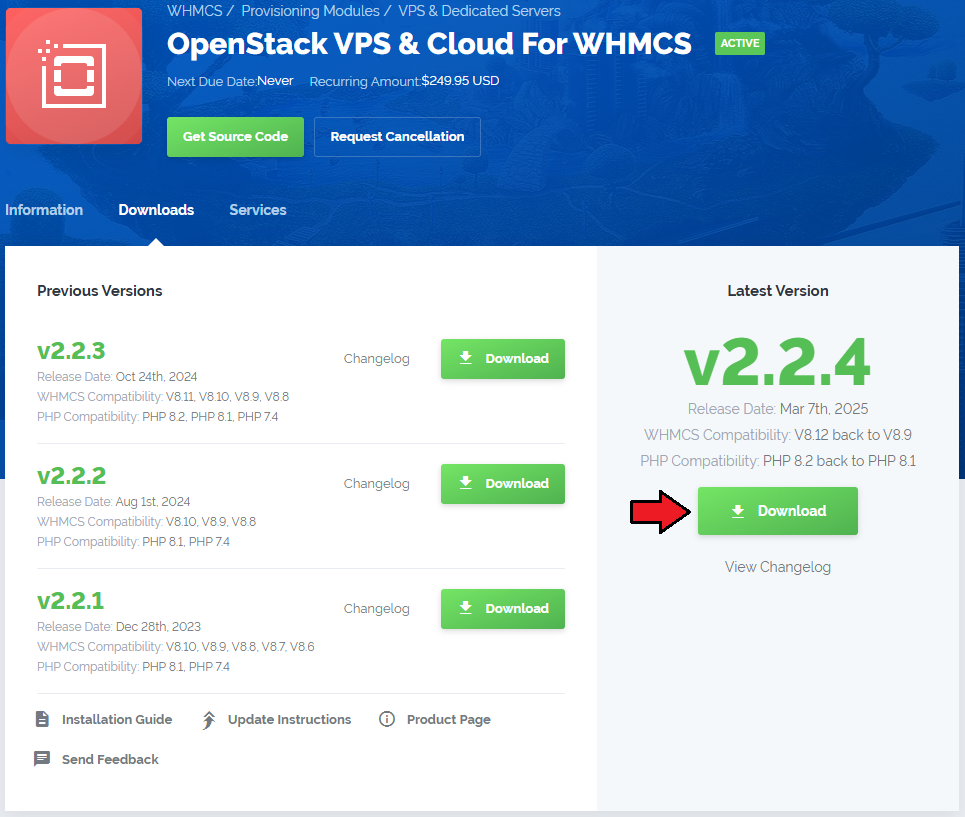
|
| 2. Upload and extract the module into the main WHMCS directory. |

|
| 3. When you install OpenStack VPS for the first time you have to rename 'license_RENAME.php' file. File is located at 'modules/servers/OpenStackVPS/license_RENAME.php' . Rename it from 'license_RENAME.php' to 'license.php' . |
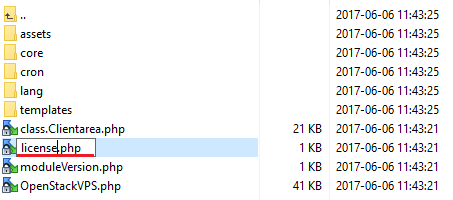
|
| 4. In order to configure your license key, you have to edit a previously renamed 'license.php' file. Enter your license key between quotation marks as presented on the following screen. |

|
Configuration of Server
| 5. Now, we will show you how to configure a new product. Go to 'Setup' → 'Products/Services' → 'Servers' and press 'Add New Server' . |
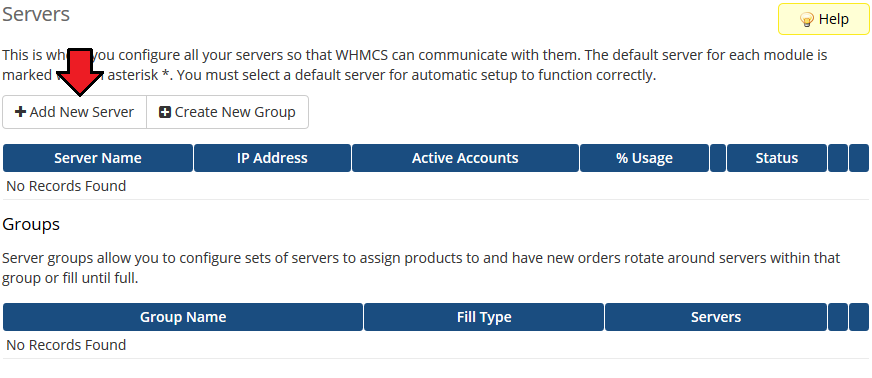
|
| 6. Next, enter your server name, IP address/hostname, username, password and admin tenant ID. Choose 'OpenStackVPS' from a dropdown menu and press 'Save Changes' . |
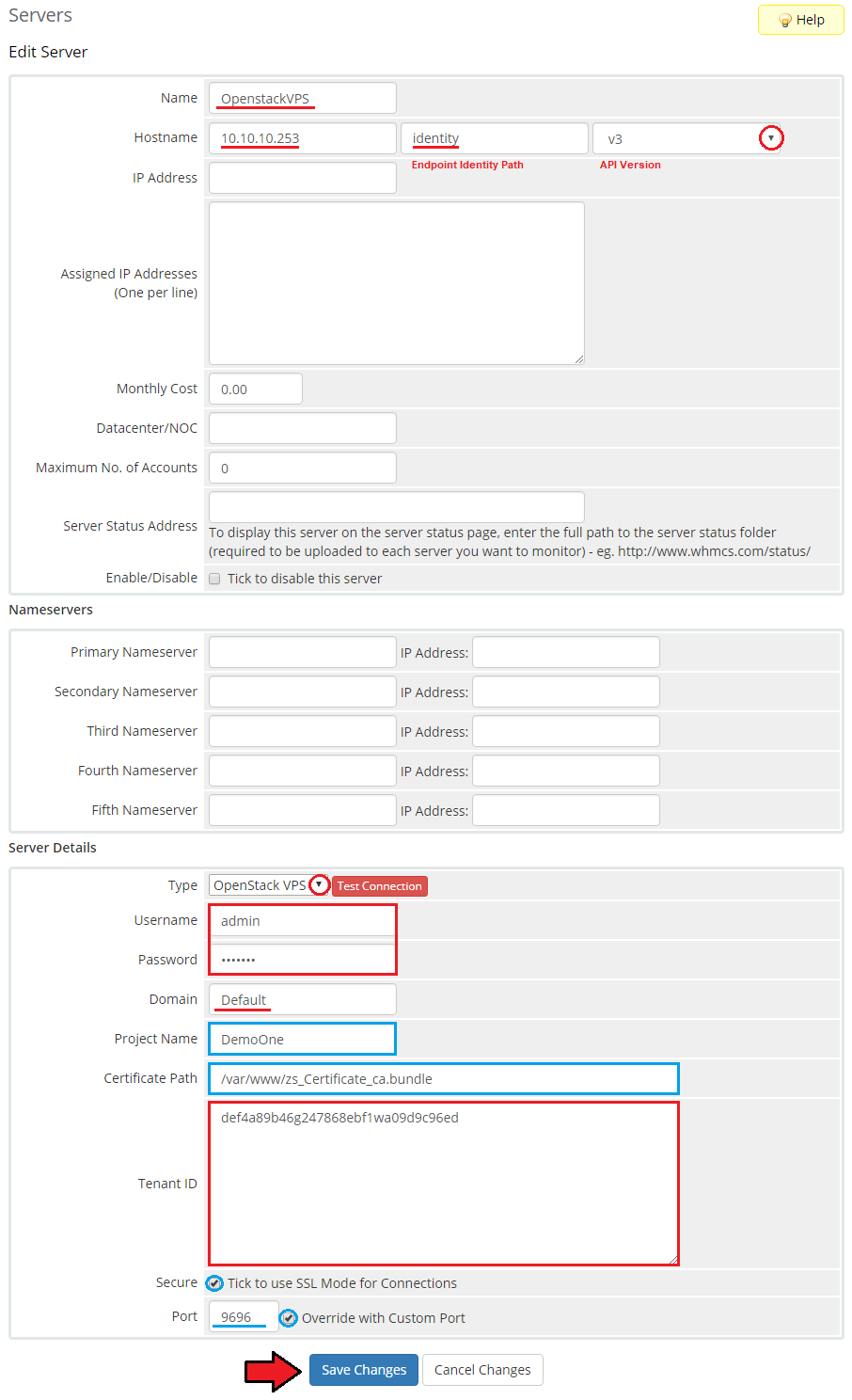
|
| 7. After you configure your server correctly, you will see a following screen. You can check connection with OpenStack server, simply edit previously created server and press 'Test Connection' as shown on the screen below. |
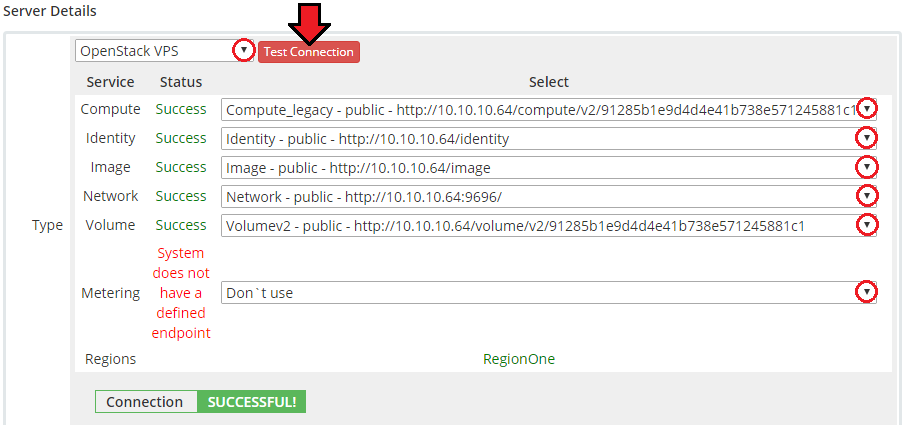
|
| 8. It is time to create a server group. To do so, click on a 'Create Server Group' . |
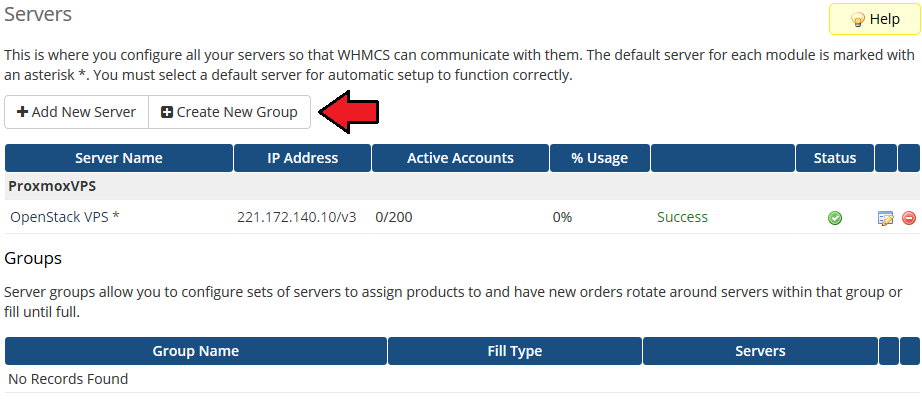
|
| 9. Enter name, click on your previously created server, press an 'Add' and afterwards a 'Save Changes' . |
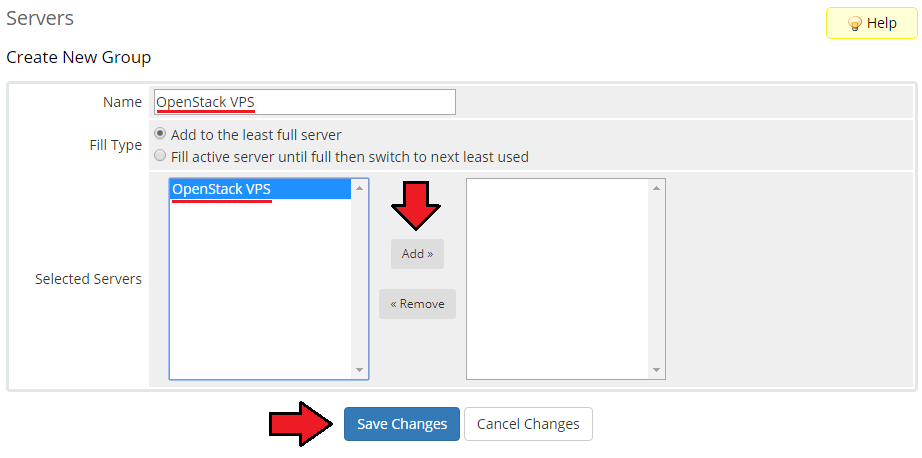
|
Configuration of Product
| 10. In order to create and configure a product go to the 'Setup' → 'Products/Services' → 'Products/Services' . Click on 'Create a New Group' . |

|
| 11. Enter product group name and press 'Save Changes' . |
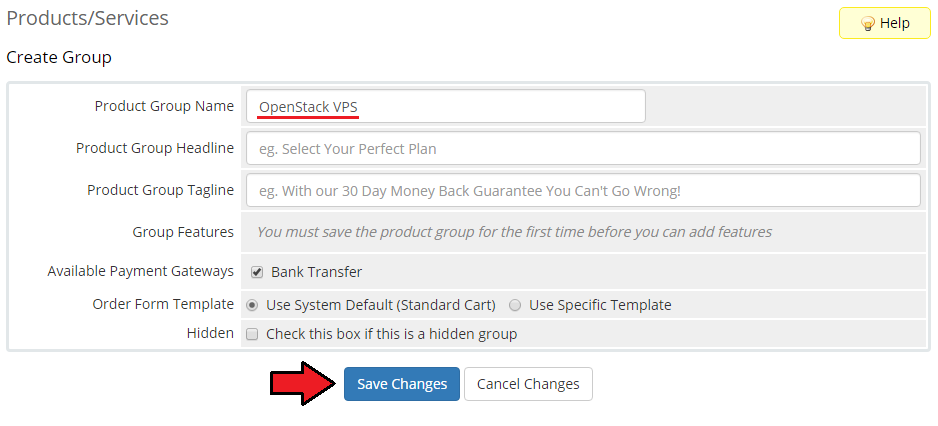
|
| 12. When you have a product group, you can create your product. To create a product click on 'Create a New Product' . |

|
| 13. Afterwards, choose your product group and type from dropdown menus, enter your product name and press 'Continue' . 'Product Type' should be set to 'Dedicated/VPS Server' . |

|
| 14. Now, go to the 'Module Settings' section, choose both 'OpenStackVPS' and your previously created server group from dropdown menus. Next, click on 'Save Changes' . |
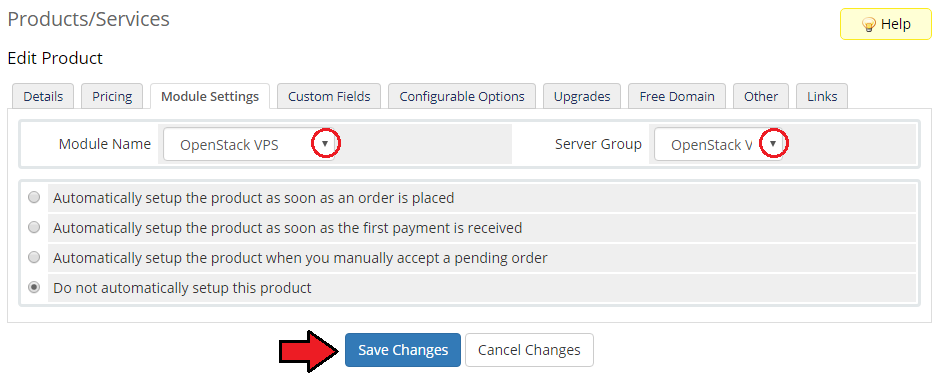
|
VPS With Predefined Resources
| Our module allows you to offer OpenStack VPS to your client in two ways: with predefined resources and configurable resources. In this section we will show you configuration of VPS with predefined resources. |
| 15. Start from selecting 'Default Tenant' , 'Default Flavor' and 'Default ISO Image' . |
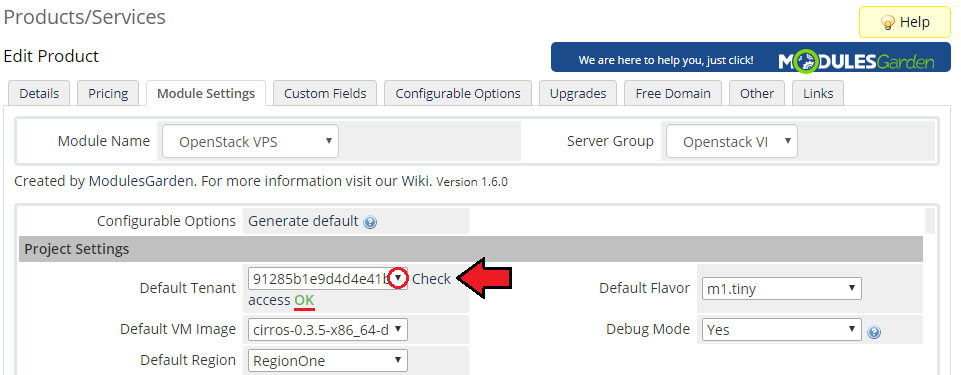
|
| 16. Afterwards, it is time to set up a network. Choose 'Fixed Network' , 'Floating Network' and 'Default Number Of IP Addresses' . You can set up network in two ways, more about them you can find here. |

|
| 17. Finish through selecting features available at the client area. Mark checkbox next to the feature to enable it. Press 'Save Changes' when you are done. |

|
VPS With Configurable Resources
| 18. Preparing VPS with configurable options starts of pressing 'Generate default' as shown on the following screen. It will prepare default configurable options which can be afterwards easily edited by you based on this article. |

|
| 19. Afterwards, it is time to set up a network. Choose 'Fixed Network' , 'Floating Network' and 'Default Number Of IP Addresses' . You can set up network in two ways, more about them you can find here. |
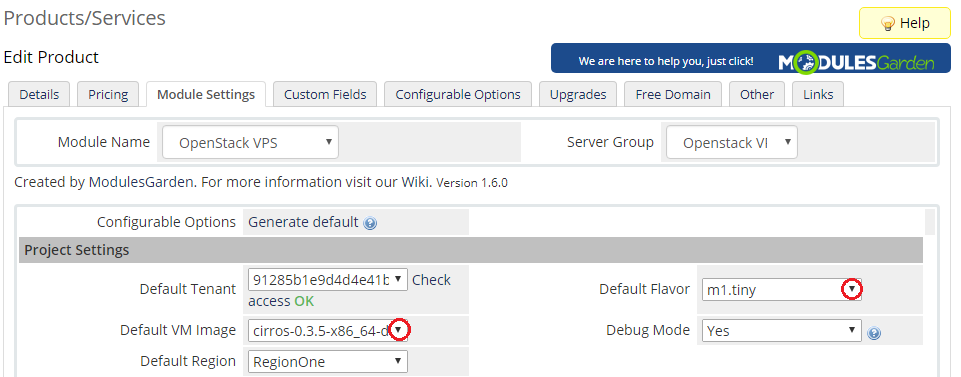
|
| 20. Finish through selecting features available at the client area. Mark checkbox next to the feature to enable it. Press 'Save Changes' when you are done. |
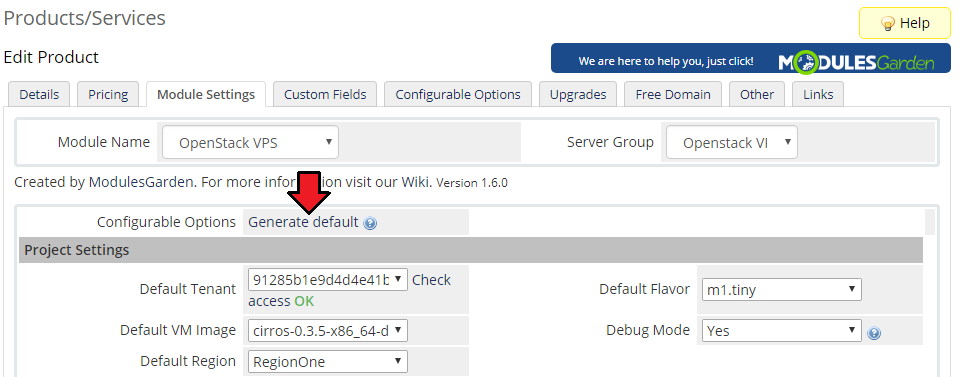
|
| Congratulations! You have just finished the installation and configuration of the module. |
Management
| OpenStack VPS For WHMCS allows your customers to manage their OpenStack VPS via client area in your WHMCS system. You can monitor and manage each product from your WHMCS admin area. |
| File:OSV23 5.png |
| Afterwards, enter IP address in a textbox and confirm through 'Save Changes' . |
| File:OSV23 6.png |
Interface
| Client area interface of OpenStack VPS should look like the one on the screen below. As you can see, control panel contain useful options needed for managing VPS. Module allows your customers to easily boot(1), reboot(2), stop(3) and shutdown(4) their servers through pressing specified button. |
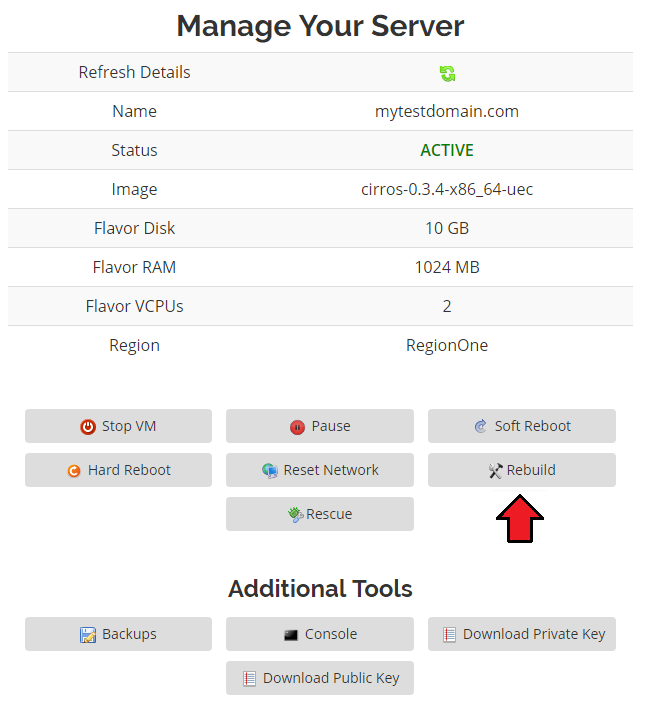
|
VNC Console
| One of the most interesting functionality is VNC console(6) where your clients can remotely manage server. To access it, simply press on the 'Console' button. Console requires Java software. You need to accept security risk to run it. |
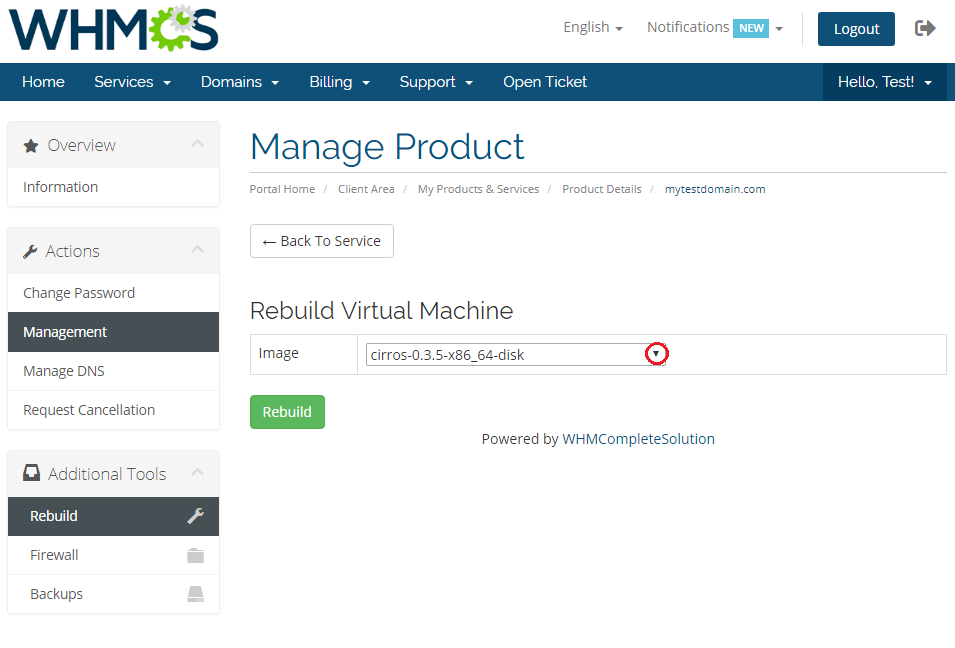
|
Reinstall
| Reinstall feature allows to change template from available templates list. To reinstall your server, choose a template and click on 'Reinstall' (5) button. |
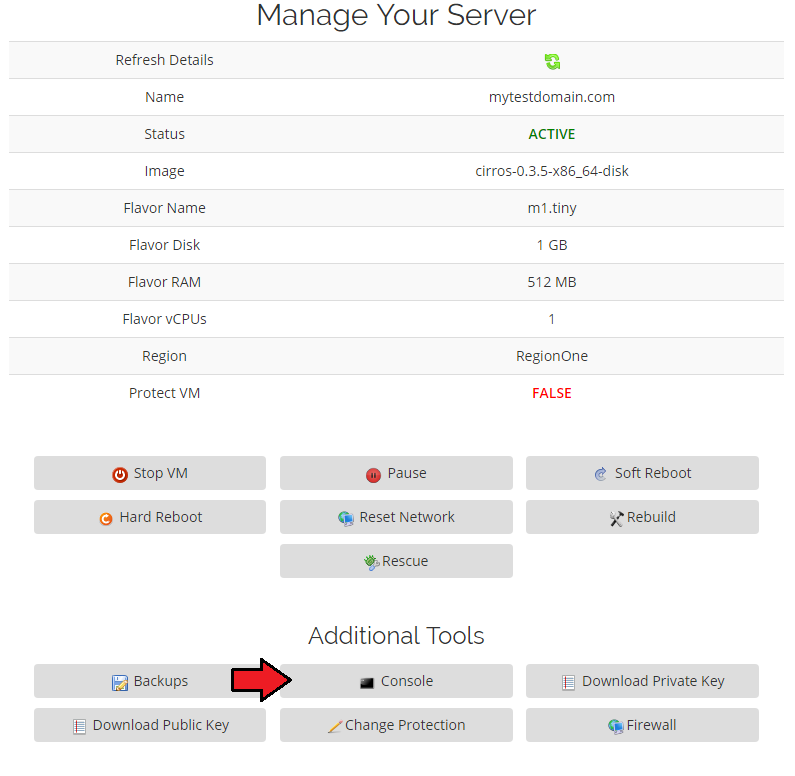
|
Backup Jobs & Backup
| By pressing 'Backup Jobs' (8) in your client area, you will be carried to backup jobs management page. To add new backup job press 'New Job' as shown on the following screen. |
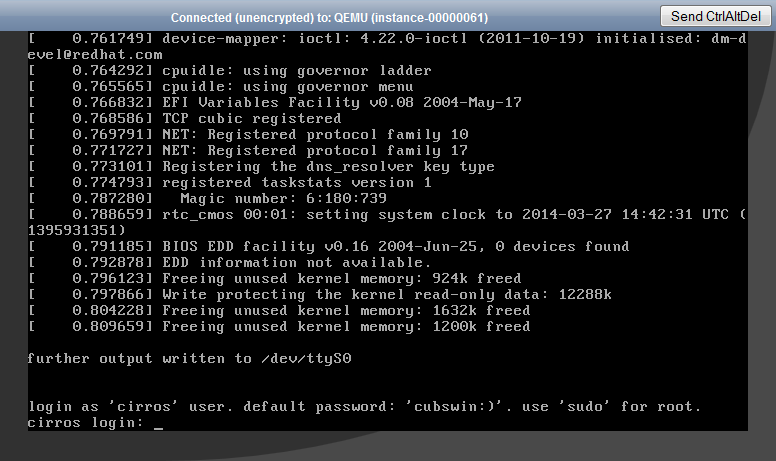
|
| Now define backup time, mark days to run it and choose 'Compression Dump File' and 'Backup Mode' from dropdown menus. Next, press 'Add' button. |
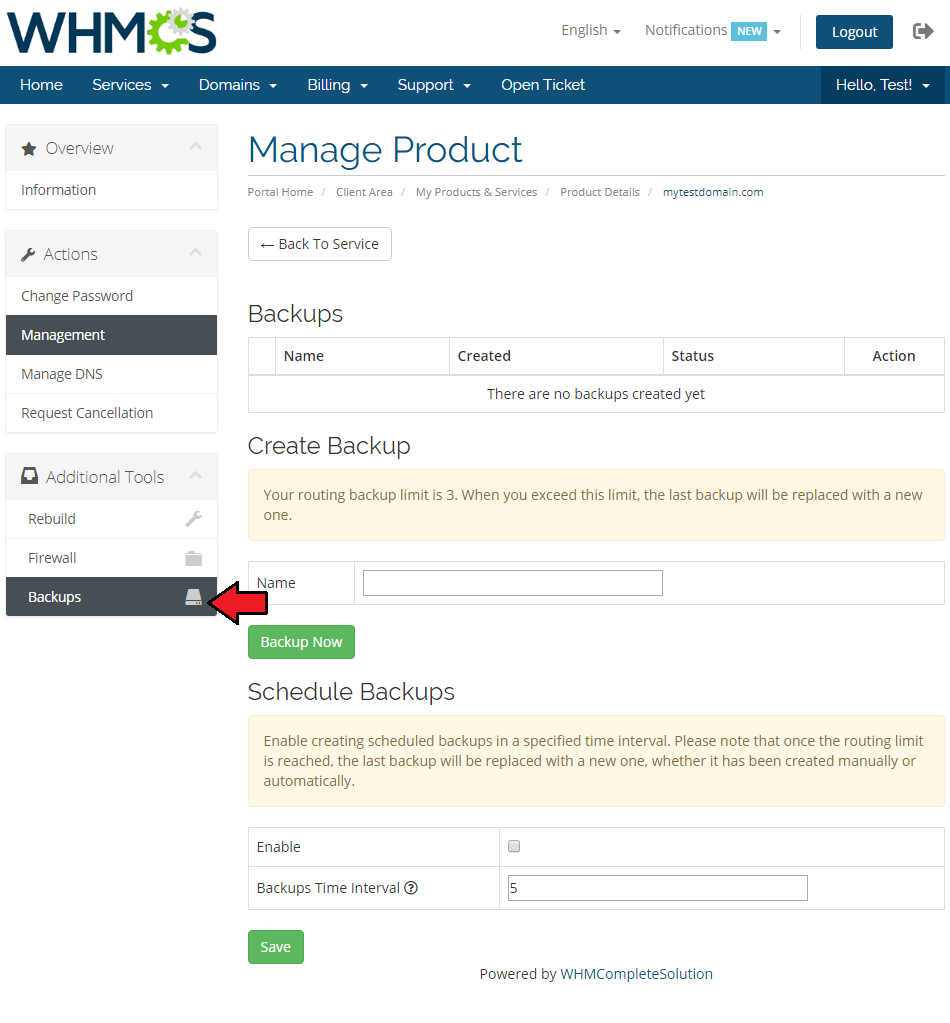
|
| You can also create a single backup. To do so, press 'Backup' (7) button and click on 'New Backup' as shown on the following screen. |
| File:OSV31 2.png |
| Now choose 'Compress Dump File' and 'Backup Mode' from dropdown menus. Afterward press 'Add Backup' . |
| File:OSV31 3.png |
| To restore VM from backup simply press 'Restore' and then click 'OK' button in a popup window to confirm. |
| File:OSV31 4.png |
| In main product page in the client area, under 'Details' headline your client can find information about current usage of CPU, memory and disk (OpenVZ only). Customer can also view 'DNS' (OpenVZ only) and 'IP Addresses' . |
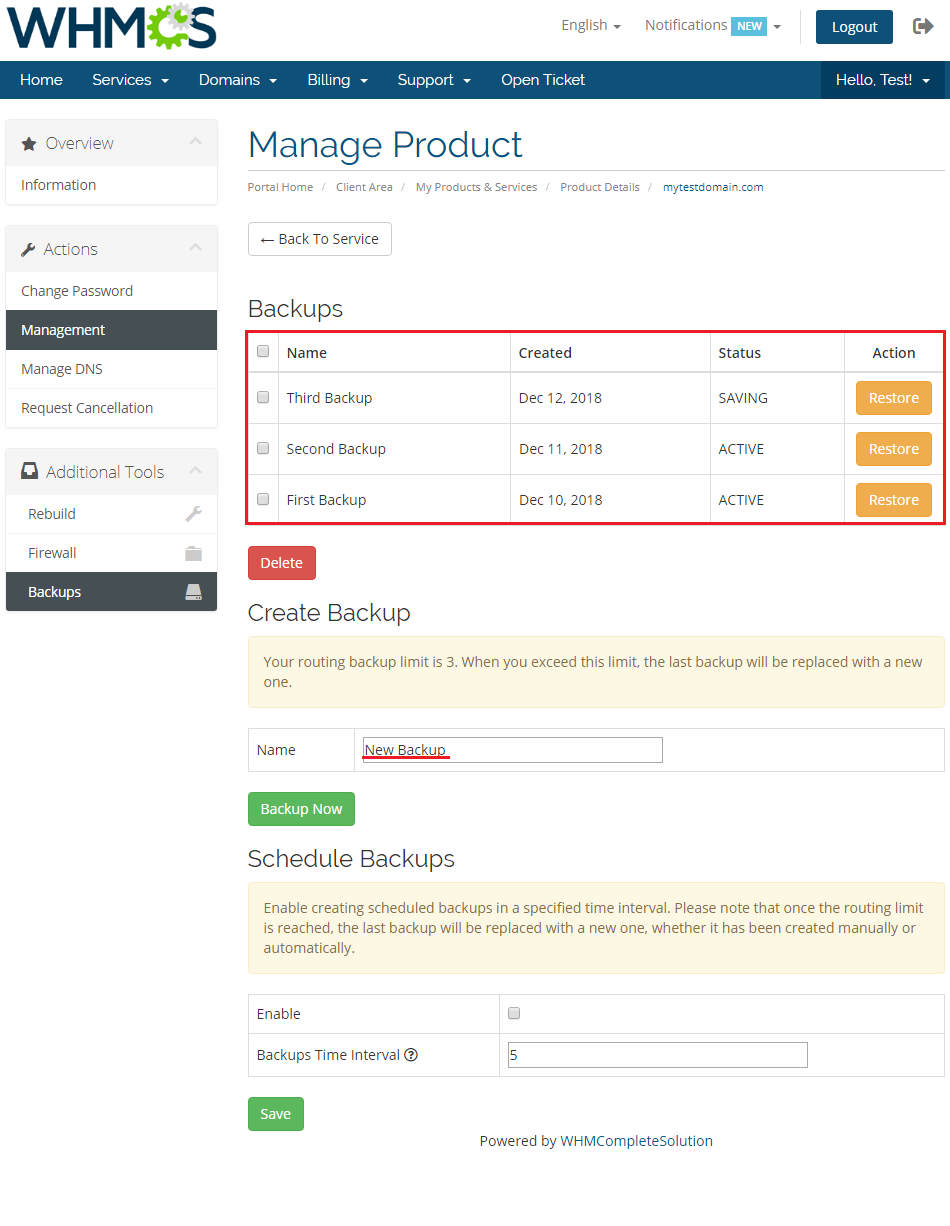
|
Graphs
| Under 'Details' section client can find graph of CPU usage, memory usage, network traffic and disc I/O. He can also switch timeline of the graphs by choosing it from a dropdown menu pointed at the following screen. |
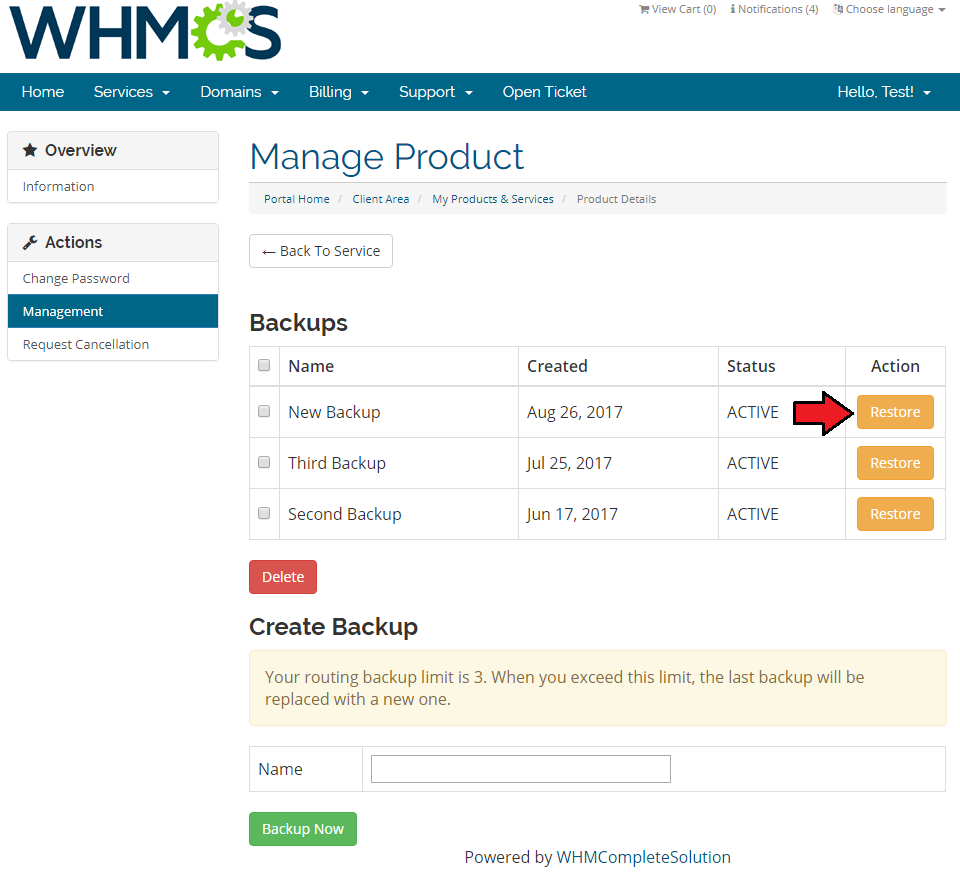
|
Network Configuration Cases
| OpenStack VPS For WHMCS allows you to set up two types of network. First one is network without floating IP address. To set up this type of network, choose 'Public' as 'Fixed Network' and 'Disabled' as 'Floating Network' . |
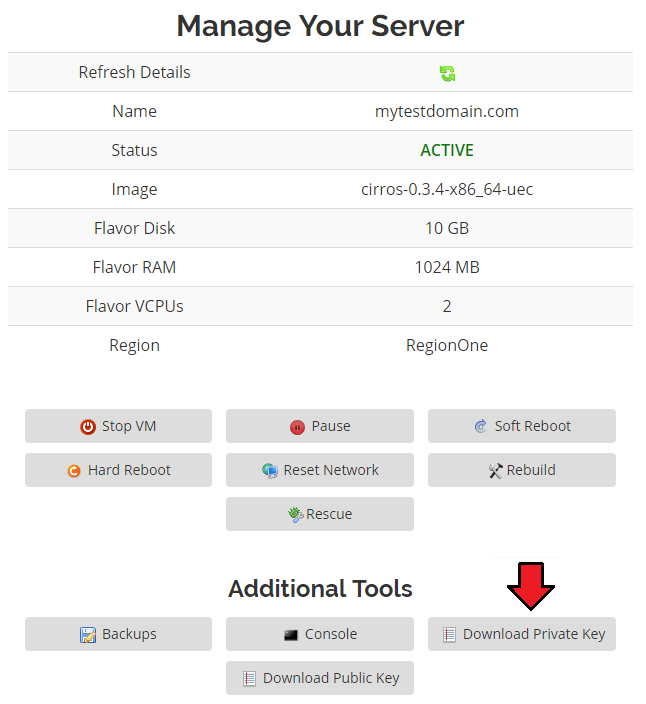
|
| Second type of network is a network with floating IP address. Select "Shared Network' as 'Fixed Network' and 'Public' as 'Floating network' . |
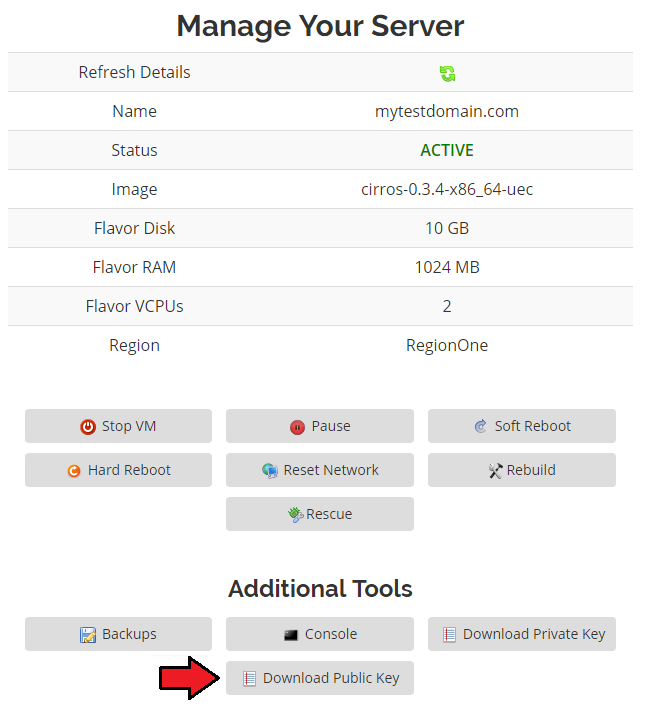
|
Tips
| 1. Operations performed on the virtual servers are not executed immediately. Give your Proxmox Virtual Environment some time for processing the request and execution of operation. |
Common Problems
| 1. When you have problems with connection, check whether your SELinux or firewall is not blocking ports. |